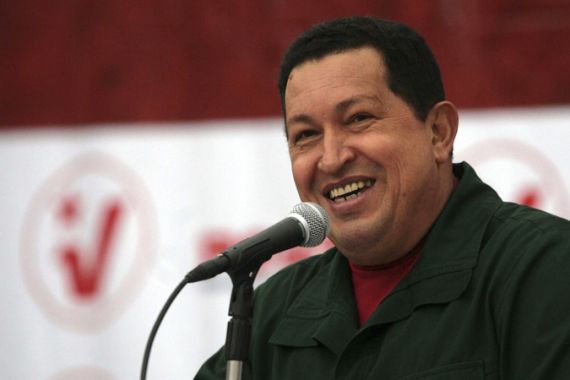Venezuela and US in row over envoy
Chavez warns that rejected US envoy will be detained and deported if he arrives in the South American country.

 |
| Hugo Chavez, Venezuela’s president, said that the US is continuing its policy of aggression against his country [Reuters] |
Venezuela has slammed US plans to appoint an ambassador rejected by Caracas, saying that Washington’s statements on the matter were consistent with its policy of aggression against the South American country.
Hugo Chavez, the Venezuela president, warned on Saturday that Larry Palmer, Washington’s nominee for ambassador, would be detained and put on the next flight home if he tries to set foot in the country.
For months Chavez has been warning that Palmer, President Barack Obama’s nominee, would not be welcome under any circumstances due to critical remarks he made about the Venezuelan government.
During his Senate confirmation process, Palmer suggested that morale is low in Venezuela’s military, and also expressed concern about Colombian rebels finding refuge in Venezuela.
“He went ahead and said whatever he felt like saying, disrespecting Venezuela, a group of honourable generals … the government, the Venezuelan constitution,” Chavez said in a televised speech. “How is he going to be ambassador? He disqualified himself.”
Chavez chuckled as he addressed Nicolas Maduro, the foreign minister, saying Palmer must be stopped if he attempts to fly into Caracas’ international airport, in nearby Maiquetia.
“If he arrives at Maiquetia, grab him, Nicolas, grab him,” Chavez said. “Give Mr. Palmer a coffee from me, and then ‘bye-bye.’ He cannot, he cannot enter this country.”
The US State Department has insisted it stands behind Palmer as the best candidate for the job.
“President Obama nominated Larry Palmer to serve as ambassador to Venezuela because he has a unique combination of experience, skill, and wisdom to successfully represent our nation in Caracas. We have never wavered in that view,” the department said in a written statement released on Sunday.
“We regret the Venezuelan government’s announcement that it intends to withdraw agrément. It will bear the responsibility for that action. We believe that precisely because there are tensions in the relationship, it is important to maintain diplomatic communications at the highest level.”
Disputed allegations
Palmer triggered outrage in the Chavez administration when he told a US senator that morale was low in the Venezuelan military and that there were clear ties between members of the country’s government and FARC rebels in neighbouring Colombia.
His comments came at a particularly sensitive time after Bogotá accused Caracas of sheltering the leftist guerrillas on Venezuelan soil.
Chavez denied the allegations and briefly cut diplomatic ties with Colombia over the row.
The latest dispute came a day after Venezuelan lawmakers voted to let Chavez bypass parliament and rule by decree for 18 months.
He says he needs them to deal with the fallout from floods that have forced nearly 140,000 Venezuelans from their homes.
That move was denounced by opposition rivals and the US State Department as autocratic.
Supporters of the president say he is simply redressing years of imbalance and that he has actually encouraged democracy by giving power and funds to grass-roots groups.